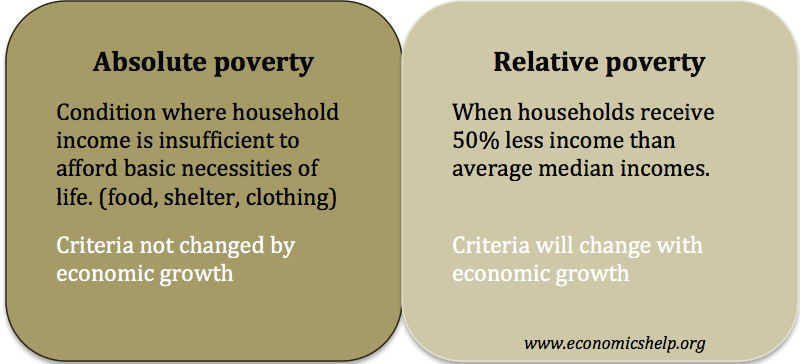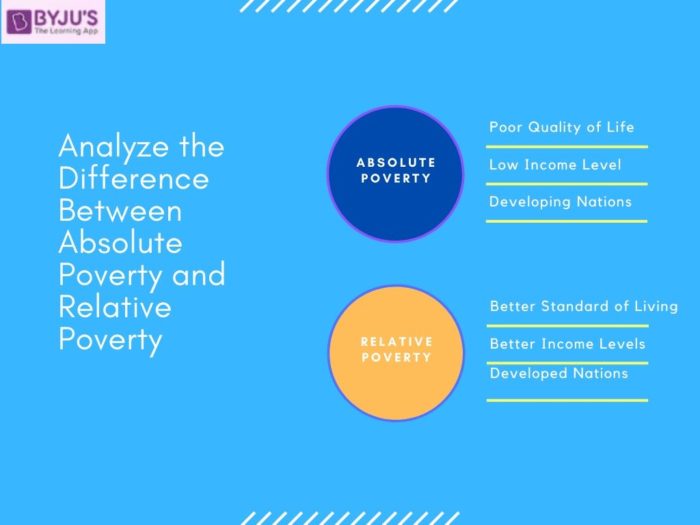Absolute poverty does not change over time. Absolute poverty refers to a persons inability to satisfy their fundamental necessities with the bare minimum of revenue.

Definition Of Absolute And Relative Poverty Economics Help
Let us take a closer look at the two concepts absolute and relative.

. Relative poverty on the other hand is established in relation. What is relative poverty absolute poverty and humane poverty. Try to explain the differences between these definition by giving examples.
Absolute has specific fiscal outlines. Absolute poverty compares households based on a set income level and this level varies from country to country depending on its overall economic. Absolute poverty is a state of being in which a person lacks the necessities of life such as food clothing and shelter.
Absolute poverty relative poverty and social exclusion. Most of our countrys current social progress is viewed in relative terms. While absolute poverty usually does not change much relative poverty changes in relation to the standard of living in an area.
Differences between Absolute Poverty and Relative Poverty In the case of absolute poverty income level is taken into account. Absolute poverty-absence of enough money to secure lifes necessities possible to have thing required and still be poor relative poverty- measured by comparing economic conditions of those at bottom with economic conditions of people in same society definition of. For example there is a concept of absolute poverty that is used.
Measuring Relative Poverty. Try to explain the differences between these definition by giving examples. Two ways poverty can be measured are as absolute poverty or relative poverty.
What is relative poverty absolute poverty and humane poverty. Relative poverty defines income or resources in relation to the average. Absolute poverty is where a persons income falls below the minimum level to meet basic needs such as food shelter clothing access to clean water etc.
There are basically three current definitions of poverty in common usage. Relative poverty measures the difference between a persons resources and the average cost of living requirements in an area. Which definition is the basis of the poverty line.
Relative poverty is defined in relation to the overall distribution of income or consumption in a country. Relative poverty is perhaps the best measure to compare country against country. Explain the difference between poverty defined absolutely and poverty defined relatively.
What does Absolute mean. Absolute poverty is defined as the lack of sufficient resources with which to keep body and soul together. Making it subject to change and not comparable between countries.
That poverty is relative to the society you live in. The main difference between Relative Poverty and Absolute Poverty is that Relative Poverty can be stated when a family is destitute of the norm living standards decided by the society they live in while Absolute Poverty is when there is a situation that a family or a person lack proper income and proper basic standards of living. The primary differences between absolute and relative poverty are that absolute poverty focuses more on the biological needs while relative poverty has nothing to do with biological needs.
The World Bank recently defined the new absolute poverty line as the percentage of the population of country living on less than 190 a day PPP at constant 2011 prices. When you are looking at an absolute perspective you are not taking into account other similar people or products. Absolute poverty - it is poverty being percentage level below the median income of a country.
Poverty is a type of social exclusion that comes when an individual or family fails to meet an established threshold. No one is living on less than a dollar a day which is usually used as a measure of absolute poverty a figure used globally to define when poverty is so extreme that its impossible to survive on it. Relative poverty on the other hand refers to conditions which are subjective to the society in which the person lives and therefore does vary between countries and can change over time eg.
According to the definition of more Absolute poverty any person who is not in a position to meet the most basic commodities to sustain life like food shelter and clothing is. Relative Poverty refers to the standard of living compared to economic standards of living within the same surroundings. Where as relative poverty is the term given to people who are living below a certain income threshold in a particular country.
The UK is the worlds sixth largest economy or maybe fifth. More urban cities will have greater education energy and. Relative poverty compares the lowest segments of a population with upper segments usually measured in income quintiles or deciles Lok-Dessallien 2000.
Thus the difference between absolute and relative definitions of poverty is the absolute level of deprivation subsistence level and culturally defined standard of living. A person who lives in relative poverty in the United States is. In contrast relative poverty is a condition in which a persons income is insufficient to meet his or her needs when compared to others in society.
It changes as the wealth of a nation changes and is a useful tool for making comparisons. Our commonly used measure of relative poverty is the nations poverty line. Relative poverty on the other hand refers to a persons financial situation in contrast to others in community.
You are taking an object as it is and coming to a conclusion based on what it has to offer. In other words it is the level of households income below a certain level of income known as poverty line and if the income level of households are below t View the full answer. Absolute poverty refers to a set condition which is the same in every country and does not change over a period of time.
There is both a statistical measure 50 - or less of the average income and a wider concept. Here in the UK we look at relative poverty. On the other hand relative poverty aims to compare two households or individuals in a locality.
Absolute Poverty is used to describe a condition where an individual does not have the financial means to obtain commodities to sustain life. Absolute poverty refers to subsistence below minimum socially acceptable living conditions usually established based on nutritional requirements and other essential goods.

Absolute And Relative Poverty Definition Of Absolute And Relative Poverty Tejvan Pettinger Studocu
Difference Between Relative Poverty And Absolute Poverty Difference Between

Difference Between Absolute Poverty And Relative Poverty With Their Detailed Comparisons
0 Comments